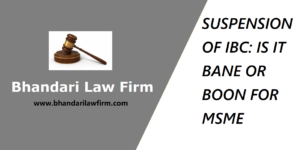Before Going into The Registration Process Under MSME Act, We Have to Know What is MSME?
The Micro Small and Medium Enterprises (MSMEs) sector is a major contributor to the socio-economic development of the country. In India, the sector has gained significant importance due to its contribution to the Gross Domestic Product (GDP) of the country and its exports. The sector has also contributed immensely with respect to entrepreneurship development especially in semi-urban and rural areas of India Registration Under MSME Act
According to the provisions of Micro, Small & Medium Enterprises Development (MSMED) Act, 2006 the Micro, Small and Medium Enterprises (MSME) are classified in two classes i.e. Manufacturing Enterprises and Service Enterprises. Registration Under MSME Act
The enterprises are further categorized based on investment in equipment and annual turnover.
| Criteria | Manufacturing | Service | ||
| Turnover | Investment | Turnover | Investment | |
| Micro | Rs. 5 crore
(US$ 0.6 million) |
Less than Rs. 25 lakh (US$ 0.03 million) | Rs. 5 crore
(US$ 0.6 million) |
Less than
Rs. 10 lakh (US$ 0.01 million) |
| Small | Rs. 50 crore
(US$ 6.8 million) |
More than Rs. 25 lakh (US$ 0.03 million) but less than Rs. 5 crore (US$ 0.6 million) | Rs. 50 crore
(US$ 6.8 million) |
More than Rs. 10 lakh (US$ 0.01 million) but less than Rs. 2 crore (US$ 0.3 million) |
| Medium | Rs. 250 crore (US$ 34 million) | More than Rs. 5 crore (US$ 0.6 million), but less than Rs. 10 crore (US$ 1.4 million) | Rs. 250 crore (US$ 34 million) | More than Rs. 2 crore
(US$ 0.3 million) but does not exceed Rs. 5 crore (US$ 0.6 million) |
The Micro, Small, and Medium Enterprise sector is considered the backbone of the Indian economy that has contributed substantially to the socio-economic development of the nation at large. It provides employment opportunities and works for the betterment and development of backward and rural areas.
India has approximately 6.3 crore MSMEs. The number of registered MSMEs grew 18.5% Y-o-Y to reach 25.13 lakh (2.5 million) units in 2020 from 21.21 lakh (2.1 million) units in 2019. The Indian MSMEs sector contributes about 29% towards the GDP through its national and international trade. Registration Under MSME Act
Having Any question regarding MSME feel free to call on 9855677966 or CLICK HERE for FAQ
According to data shared by the MSME Minister in the Rajya Sabha, the registered MSME is dominated by micro-enterprises at 22.06 lakh (2.2 million) units in 2020 from 18.70 lakh (1.8 million) units in 2019, while small enterprise units went up from 2.41 lakh (0.24 million) units to 2.95 lakh (0.29 million) units. Midsized businesses only increased from 9,403 units to 10,981 units during this period.
MSMEs are being encouraged to market their products on the e-commerce site, especially through Government e-Marketplace (GeM), owned and run by the government, wherefrom Ministries and PSUs (public sector undertakings) source their procurement. The platform has recorded transactions worth Rs. 55,048 crore (US$ 7.5 billion) until September 2020.
Also Read: Dispute Resolution Under MSME Act
Domestic business requires a strong fiscal stimulus with concessional working capital loans to ensure adequate liquidity is maintained in business operations from the government and financial institutes.
Government Policies for MSME Firms
The Government of India has designed various policies for the growth of MSMEs in the country.
- Budget allocation for MSMEs in FY22 more than doubled to Rs. 15,700 crore (US$ 2.14 billion) vis-à-vis Rs. 7,572 crore (US$ 1.03 billion) in FY21.
- The government also announced Rs. 3 lakh crore (US$ 40.85 billion) collateral-free automatic loans for businesses.
- In Union Budget 2021, the government announced funds worth Rs. 10,000 crore (US$ 1.36 billion) for the ‘Guarantee Emergency Credit Line’ (GECL) facility to eligible MSME borrowers, giving a major boost to the sector.
Recent Developments for MSME Firms:
- In March 2021, the Finance Ministry allowed private retirement funds to invest up to 5% in Category I & II AIFs regulated by SEBI; this will help widen the fundraising options for MSMEs and expand the domestic pool of capital
- Category 1 AIFs consists of infrastructure, venture capital, angel and social venture funds. Category II AIFs covers funds where at least 51% of the size can be invested in either infrastructure, SMEs, venture capital, or social welfare entities
- In March 2021, MSME support and development organization, National Small Industries Corporation (NSIC) announced that they will assist MSMEs working with the Agricultural and Processed Food Products Export Development Authority (APEDA) across multiple areas
- The NSIC, through an MoU with APEDA, will help its MSME members in exploring the export potential of their agricultural and processed foods products. Additionally, APEDA members will get access to NSIC schemes, which would help them address issues pertaining to technology adoption, skills, product quality, and market access
- The relationship will also support the promotion of green & sustainable manufacturing technology for MSME clusters, enabling units to switch to sustainable and green production processes and products
- In February 2021, Walmart’s Vriddhi program was extended to Uttar Pradesh, with the launch of an e-institute to facilitate small businesses in granting access to skills and competencies across online and offline platforms such as Flipkart’s marketplace and Walmart’s global supply chain. The company stated that this new e-institute will benefit 50,000 MSMEs across the country to expand domestically and globally.
- In February 2021, Mastercard and Razorpay signed a partnership to help small businesses and entrepreneurs in India embrace digital payments. The partnership integrates Razorpay’s payment processing capabilities with Mastercard’s digital banking platforms and card services.
- In February 2021, the Bank of Maharashtra has collaborated with Vayana Network, a supply chain financing (SCF) platform, to provide financial assistance to the MSME market. Through this partnership, the bank will provide short-term credit to address the budget needs of legitimate corporate dealers/vendors through the bank’s ‘Mahabank Channel Financing Scheme’ and Vayana Network’s expertise.
- In February 2021, Indian Bank signed a memorandum of understanding (MOU) with the Society for Innovation and Development (SID), a project of the Indian Institute of Science, to provide exclusive credit to start-ups and MSMEs.
- In February 2021, the Small Industries Development Bank of India (SIDBI), a financial institution dedicated to the promotion, financing, and development of micro, small, and medium enterprises (MSMEs), signed an agreement with the government of Andhra Pradesh to help expand the state’s MSME ecosystem.
Achievements in MSME Sector Registration Under MSME Act
The Ministry of MSME runs numerous schemes targeted at providing credit and financial assistance, skill development training, infrastructure development, marketing assistance, technological and quality up-gradation, and other services for MSMEs across the country.
Also Read: Suspension of IBC: Is It Bane Or Boon For MSME
Registration process under MSME Registration Under MSME Act
For registration under MSME, the applicants have to fill the form and has to provide the following particulars.
Requirements for filling Udyam Registration Form under MSME
Mobile Number: Applicants are required to enter his / her Indian mobile number. Do not add +91.
Email Id: Applicant are required to enter his / her email id, as certificate and acknowledgment will be sent to registered id
Aadhaar Number: Applicant can enter his / her 12 digit Aadhaar number.
Applicant Name: Applicants are required to enter his / her name as mentioned on the Aadhaar card, issued by UIDAI.
Social Category: Applicant can select the social category.
Gender: Applicant can select gender category.
Physically Handicapped: Applicant can select his / her disability.
Business Name: Applicant has to enter his / her business name, as it will get printed on the certificate.
Type of Organization: Applicant has to select the type of organization, as it will get printed on the certificate.
Pan Card Number: Applicant has to enter his / her PAN card number in case of Co-Operative / Private Limited / Public Limited / Limited Liability Partnership. Optional for Proprietorship Firm / Partnership Firm / Hindu Undivided Family / Self Help Group / Society Trust.
GSTIN Number: Applicants have to enter their firm GST Number or the owner’s GST Number.
MSME Registration Number: In case applicants have already registered under MSME, their MSME number is required.
Factory or Plant Address: Applicants are required to enter his/her complete plant address with state and Pincode.
Office Address: Applicant can enter his / her complete office address with state and Pincode
Date of Commencement of Business: Applicant has to select the date of business started, as it will get printed on the certificate.
Bank Account Number: Applicant can enter his/her bank account number.
IFSC Code: Applicant can enter his / her bank IFSC code.
Main Business Activity of Enterprise: Applicant can select the main business activity.
Nature of Business or Additional Details About Business: Applicant can enter additional details about the business. (For example – manufacturing of Food Products, Computer Programming, Software Development)
The number of Male Employees: Applicant can enter a number of male workers in his / her firm.
The Number of Female Employees: Applicant can enter the number of female workers in his / her firm.
Investment in Plant & Machinery / Equipment: Applicant can enter the total investment made in Plant, Machinery, and Equipment, etc. to start his / her business.
Turnover: Applicant can enter previous year Turnover of his / her business.
Aadhaar Card: Applicant can attach scan copy of Aadhaar Card front side (jpg, png file less than 5 MB)
Note: For any further information or any query you may contact us on 9855677966 or via email at info@bhandarilawfirm.com



